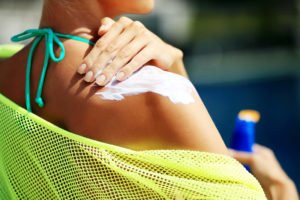How long have you been waiting for the sun to make an appearance this year? Temperatures have been below average, and March was the wettest in over 40 years. However, when our chance arises to soak up the sunshine, we need to be ready.
Although the sun can enhance our moods it also has the potential to damage our skin. Therefore, its essential for us to take precautions ahead of – and during – trips to sunnier climes and within the UK.
Figures from Cancer Research UK reveal that melanoma skin cancer is the fifth most common type of cancer in the UK, with 100,000 new cases of skin cancer diagnosed in the UK every year. Plus, the chance of getting melanoma skin cancer in the UK is 1 in 36 for males and 1 in 47 for females.
Yet, it’s not all bad news – almost 90% of people diagnosed with melanoma skin cancer now survive the condition for 10 years or more. Even more encouragingly, 86% of cases are preventable, which reinforces just how vital effective awareness and preventative measures really are.

5 Sun safety tips to ensure your skin’s protected on holiday
1: Use a high factor sun cream
The benefits of sun cream are well-known, but the fact that skin cancer has steadily risen in recent years suggests that we’re still not using it as much as we should.
Getting sunburned just once every two years is enough to triple your risk of developing malignant melanoma skin cancer, so a sun cream is a vital form of protection.
There are a huge range of sun creams on the market today, with many different factors and levels of protection, but the British Skin Foundation recommends using one with a Sun Protection Factor (SPF) of at least 30 every day.
It’s also important to know your UVA from your UVB. Both types of ultraviolet (UV) radiation from sunlight can cause skin cancer, but UVA rays are more often linked with skin aging, while UVB rays are the ones that cause skin burning and cellular damage linked to most incidences of skin cancer.
Look for a waterproof sun cream that protects against both UVA and UVB rays, ideally with a five-star rating. Aim to apply two tablespoons of sun cream to your whole body for about half an hour before heading out into the sun and reapply it every couple of hours and after swimming. Don’t assume that a cloudy day on holiday means that you can skip the sun cream though; UV levels can still be high.

2:Avoid sun exposure during the hottest part of the day
You’re most likely to burn when the sun is at its strongest, which is between 11 am and 3 pm. Try to avoid prolonged exposure to the sun during these hours; find some shade or cover up with loose clothing. It’s possible to burn in strong sunlight in just 10 minutes, especially if you are very fair-skinned.
It may sound extreme, but don’t forget about the risk of sitting by windows too – UV rays can get through many standard glass windows, so it’s still possible to burn.

3: Wear suitable clothing & sunglasses
Clothing offers the best defence for your skin when outside in the sun, in addition to a suitable sunscreen. Don’t forget to wear a hat to protect your scalp and hairline, which can be tricky areas to apply sun cream to. The tips of your ears are especially sensitive to the sun and can take a long time to heal from burning, so think about opting for a wide-brimmed hat. Protect the delicate skin around your eyes with sunglasses, making sure they guard against 99-100% of both UVA and UVB rays.

4: Understand the risks of skin cancer
It’s possible for anyone to develop skin cancer, but as cellular damage can accumulate over time, the main risk factor for skin cancer is older age. Other risk factors include:
- Having more than 20 moles on your body.
- Being fair-skinned and/or fair-haired.
- Having a close family member who has had skin cancer.
- Having been badly sunburned in the past.
You also have a higher risk of developing another melanoma when you’ve already had one.
In addition to understanding what your personal risk of developing skin cancer is likely to be, it’s important to be aware of other factors that can make you more susceptible.
For example, some medications can make your skin more sensitive to the sun and therefore increase your risk of burning. Some antibiotics, allergy medicines, and certain medications for depression can all affect the way your body reacts to heat, from increasing the amount of fluid you lose through urine, to preventing you from sweating.
Read through the information that comes with your medication, or talk to your doctor if you’re unsure whether you may be at increased risk of getting skin cancer.

5: Check your skin regularly
Keeping an eye on your skin is especially important if you have already had an instance of skin cancer, but it’s a good habit for all of us to take up. Every month, take time to examine your skin from head to toe, paying special attention to moles and any changes to them, such as an increase in size, a change in colour, or a previously flat mole becoming raised. You should see a doctor without delay if you notice a mole bleeding, itching, or becoming scaly.
NHS Choices recommends checking for changes to the ABCDE of moles – Asymmetry, Border, Colour, Diameter, and Elevation or Enlargement.

Download our infographic to refer to these sun safety tips again.
Don’t head off into the sun without specialist travel insurance
Of course, no sunshine break is complete without travel insurance. With Free Spirit, having an existing health condition or disability needn’t be a barrier to getting cover. We specialise in providing travel insurance that covers a wide range of pre-existing medical conditions and disabilities to people of any age.
Simply contact us to find out more about our medical travel insurance, or apply for a quote online.



